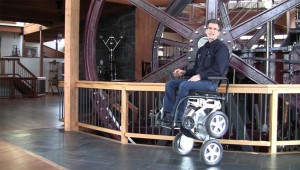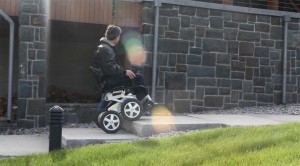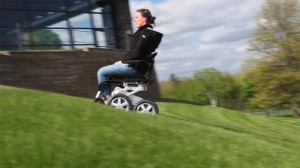Toyota is lending its support to DEKA Research to complete the development of the iBot motorized wheelchair.
The brainchild of Dean Kamen, the inventor of the two-wheeled Segway PT, the iBot is designed to overcome the traditional limits of the wheelchair. Among other things, it can climb up and down stairs, and even rise from a standard, seating position to about six feet in height.
“Toyota and DEKA share the same vision of making mobility available to people of every kind of ability,” said DEKA founder Dean Kamen. “We are excited about this new relationship and excited about what it means for making that dream a reality.”
(Most Americans wary of owning or driving in an autonomous vehicle. Click Here for more.)
A college drop-out, the 65-year-old Kamen has a wide range of inventions to his credit, from drug infusion pumps and water purifiers to solar power systems and even a prosthetic arm called Luke – meant to honor Star Wars hero Luke Skywalker. But he is likely best known for developing the Segway, a personal transportation system that uses gyroscopes and electric motors to allow a ride to comfortably balance on two wheels.
(Israeli start-up developing battery you can “fill up” at a service station. Click Here for more.)
His company, DEKA Research and Development, has spent the last two decades working on an alternative wheelchair that would offer more mobility than conventional designs. It borrows some of the underlying technologies first seen on the Segway to allow an unusual degree of motion. Among other things, the iBot can rise up and move on just two wheels.
It also can climb stairs and ride on hilly or grass-covered terrain that would normally be a problem for someone riding in a conventional wheelchair, even one with an electric motor.
DEKA tried to bring the iBot to market in 2009 but, at $25,000, it was simply too expensive to find a market.
There’s no word on how much the second generation iBot will cost, but one goal of the DEKA-Toyota appears to be finding ways to make the technology more affordable. Toyota also noted it will license balancing technologies held by DEKA and its affiliate for medical rehabilitative therapy and potentially other purposes.” That could mean the underlying hardware and electronic control systems could show up in other vehicles.
Whether that would mean some form of automotive application is uncertain. But Toyota is one of several Japanese automakers – Honda being another – working on alternative systems that could improve mobility for both senior citizens and the disabled.
“Our company is very focused on mobility solutions for all people,” said Osamu “Simon” Nagata, executive vice president at Toyota Motor North America, who announced the agreement at the Paralyzed Veterans of America’s 70th Annual Convention. “We realize that it is important to help older adults and people with special needs live well and continue to contribute their talents and experience to the world.”
(Click Here to see why Tesla is looking to raise $2 billion with a new stock offering.)



